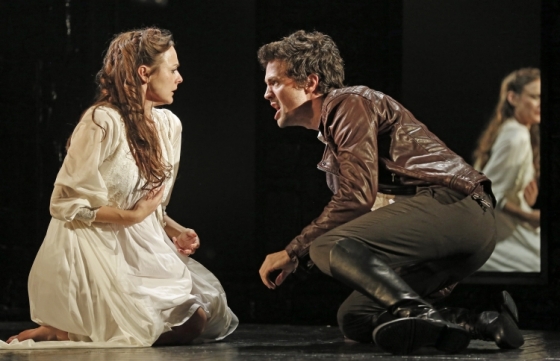
Ushering in the New Year, Red Bull Theater brings us a tragic tale of sex in payment for murder. Jesse Berger sure-handedly directs Thomas Middleton and William Rowley's 1622 tragicomedy The Changeling, the main plot of which introduces the noble Beatrice-Joanna (Sara Topham) as she finds a "giddy turning" in herself from Alonzo de Piracqo (John Skelley), to whom her father, Vermandero (Sam Tsoutsouvas), intends her to be married, towards Alsemero (Christian Coulson). In order to "change [her] saint," she eventually enlists the aid of her father's servant De Flores (Manoel Feliciano), whom she professes to abhor and whose skin condition suggests a spatter of blood across his face, to remove the obstacle that is Alonzo.
The changeling of the title can refer to the inconstant Beatrice-Joanna herself, to the objects of her affection changed one for another, or to an idiotic or imbecilic person. The last of these senses connects to the comic sub-plot, of the old-man-trying-to-control-a-young-wife variety popular in early modern drama. The secondary plot takes place in an asylum for fools and madmen, overseen by Alibius (Christopher McCann) and his man Lollio (Andrew Weems). Jealous of his young wife, Isabella (Michelle Beck), Alibius restricts her to the madhouse in an attempt to insulate her from temptation, a strategy that ends up challenged on several fronts.
Though the two plots do directly intersect at the end of the play, most of their connections are thematic. Excesses of passion were often tied to madness in early modern thought, and love is no exception, albeit hewing closer to mere foolishness in the sub-plot. In addition to parallels between Beatrice-Joanna and Isabella and their literal and metaphorical confinement, De Flores and Lollio in some ways mirror one another as well, not least in their assumption of a right to women’s bodies. Reflecting these contests of sexual ownership and access, rings and fingers appear in both plots as vaginal and phallic symbols, along with a discarded glove and its "sockets." The mirroring trope carries over to the stage itself, an all-black space with a handful of reflective surfaces that become transparent to reveal the asylum inmates, whose illness is entertainment for those on the other side of the glass. The setting is augmented with dark costumes for the nobility and white for the inmates of the asylum; Beatrice-Joanna, to start, wears a layered dress that puts her somewhere in between. In a masterful piece of staging, the production at one point blurs the two plots into one another. During the rehearsal of the asylum denizen's masque dance, commissioned for Beatrice-Joanna's wedding, the boundaries collapse between the dance of fools and madmen itself and the nuptials and wedding night, while also burlesquing elements of the main plot.
As is usual for a Red Bull production, the cast is excellent from top to bottom, and especially good at nuance and detail, from Kimiye Corwin’s innocently flirtatious Diaphanta to Bill Army’s enjoyably silly turn as the fool(ish) Antonio. Weems and McCann make a fine comic duo as Lollio and his master. Topham and Feliciano create just enough early sympathy for Beatrice-Joanna and De Flores, including, for De Flores, a soliloquy bemoaning the injustice of his desserts that recalls Edmund's on his illegitimacy in King Lear, and Topham's Beatrice-Joanna is, importantly, a layered individual, not just the "whore" that she is ultimately branded. Beck brings power and personality to the potentially thankless role of the "honest woman," and maintains them through the final moments, when she opens her mouth to respond to her husband's promise to change before she is cut off by a character from the main plot.
With The Changeling, Jesse Berger and Red Bull follow up last year's 'Tis Pity She's a Whore with another compelling look at a complex Jacobean anti-heroine. Missing this wonderfully-mounted story of the darker permutations of love and their consequences would be the real tragedy. - Leah Richards & John Ziegler
